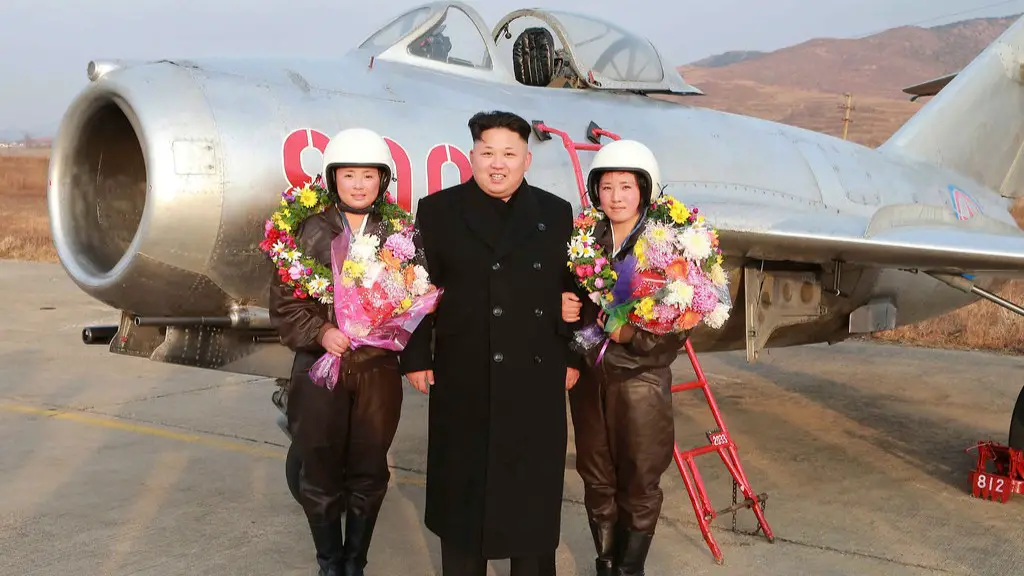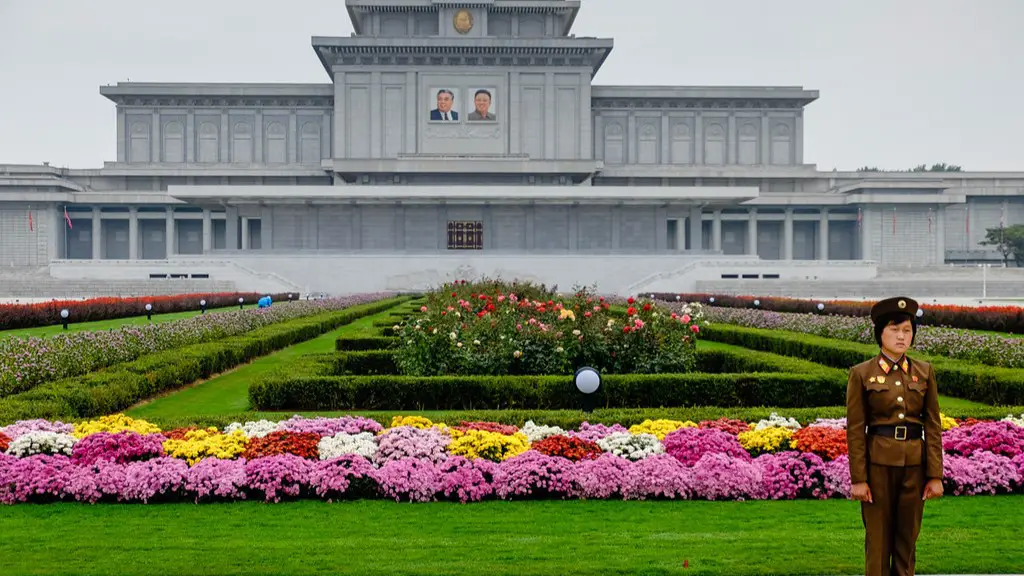The North Korea Threat
North Korea has emerged as one of the world’s most dangerous and unpredictable countries. The country is ruled by the Kim dynasty and led by its Supreme Leader, Kim Jong-un, and is believed to possess nuclear weapons. Since its creation in 1948, North Korea has made numerous military threats against its rivals in the region and beyond, and these threats have been seen as an effort by the North Korean regime to maintain its political and military power and gain leverage against its enemies.
In recent years, North Korea has threatened South Korea, Japan, and the United States. In 2017, the tension between North Korea and the United States reached its highest point when the two countries engaged in a series of verbal threats, culminating in North Korean leader Kim Jong-un announcing that he had a “nuclear button” on his desk. This announcement caused a great deal of anxiety in the region and beyond.
In 2018, North Korea threatened South Korea as part of its ongoing military aggression. North Korea threatened to launch missiles into South Korea in response to U.S.-South Korea joint military exercises. North Korean missiles flew over Japan in response to the exercises, prompting alarm in the region. North Korea also threatened to launch missiles near the U.S. island of Guam in 2017, although it never followed through on the threat.
In addition to these threats, North Korea has also engaged in cyber-attacks against its rivals and international businesses. North Korea is believed to have launched the infamous WannaCry ransomware attack in May 2017. This attack crippled businesses and government departments across the world, causing billions of dollars in damage. North Korean hackers were also believed to be responsible for a global cyber heist in 2016, which siphoned hundreds of millions of dollars from banks around the world.
It is also believed that North Korea may have been behind recent attacks on South Korean cryptocurrency exchanges. The attacks resulted in the theft of millions of dollars’ worth of cryptocurrency, demonstrating the increasingly sophisticated capabilities of the North Korean government when it comes to cyber warfare.
These threats have been met with a variety of responses from the international community. The United Nations has imposed a variety of economic sanctions on North Korea in an effort to stem its nuclear ambitions, and the United States and other countries have taken military steps to increase their defense against a potential North Korean missile attack.
International Reactions
The international community has been vocal in its criticism of North Korea’s threats and cyber-attacks. The United Nations condemned North Korea’s missile threats and human rights violations, and demanded that North Korea desist from further provocations. The U.S. and its allies have deployed additional troops and military hardware to areas around North Korea as a show of strength and to deter any potential aggression.
The international community has also levied economic sanctions against North Korea in an effort to weaken the regime and its military ambitions. Sanctions have included trade embargoes on key North Korean exports, restrictions on North Korean access to the international banking system, and the freezing of the assets of Daedong Credit Bank, a key North Korean financial institution.
The economic sanctions were intended to cause economic hardship for North Koreans in an effort to compel the regime to put a halt to its nuclear ambitions, but the sanctions have been largely ineffective. North Korea has been able to circumvent U.N. sanctions by using a variety of methods, such as smuggling, and trading with other countries outside of the purview of the United Nations.
The Potential for Conflict
The potential for a conflict between North Korea and its rivals is ever-present. North Korea’s development of nuclear weapons, coupled with its aggressive rhetoric and cyber-attacks, makes it one of the most dangerous countries in the world today.
The Trump administration has adopted a “maximum pressure” policy towards North Korea, which aims to apply economic and military pressure on the regime in order to get it to abandon its nuclear program and come to the negotiating table. However, North Korea has so far been resistant to negotiations, citing the “hostile policy” of the United States and its allies.
The risk of a conflict between the two countries is made greater by the fact that U.S. President Donald Trump and North Korean leader Kim Jong-un have a history of exchanging insults and making inflammatory statements. Whether the two sides will be able to reach a peaceful resolution to their disagreements remains to be seen.
Tensions between South and North Korea
The relationship between North and South Korea is complex, but tensions between the two have been increasing in recent years. North Korea has continued to make provocative statements and test missiles and nuclear weapons, while South Korea has responded with harsh economic sanctions and a military buildup on the border.
The tensions between North and South Korea have been exacerbated by North Korea’s increasingly aggressive rhetoric, particularly its 2018 declaration that it would “wipe out” the South Korean capital Seoul with a single strike. This threat was met with strong condemnations from both South Korean and international leaders, who fear that a conflict between the two Koreas could quickly escalate into a full-blown war.
Furthermore, North Korea’s refusal to abide by international standards on human rights has been a source of tension and a cause of concern for international observers. North Korea is believed to hold over 120,000 individuals in political prison camps, where they are subjected to torture and other atrocities.
A Look Towards the Future
It is unclear what the future holds for North Korea and its relationship with it’s neighbours, the United States and the international community. North Korea has continued to refuse to negotiate on its nuclear program, and its development of nuclear weapons and missile technology has been relentless. While the international community has taken steps to increase pressure on the regime, it remains to be seen if these efforts will be successful.
The potential for conflict between North Korea and its neighbours remains high, and the international community must remain vigilant and prepared for any potential aggression from the regime. At the same time, it is important that the international community works to find a peaceful solution to the situation, so that the security and stability of the region can be ensured.
Military Strategies of North Korea
North Korea’s military strategies are focused on maintaining control of its territory and deterring any potential aggression from its rivals. The North Korean military is believed to have over 1.2 million active personnel, and has one of the largest standing armies in the world.
North Korea’s military arsenal includes conventional weapons such as artillery, tanks, and fighter aircraft, as well as nuclear weapons and ballistic missiles. The North Korean military is also believed to have a well-developed cyber warfare capability, which it has used on multiple occasions to carry out cyber-attacks against its enemies.
North Korea’s military strategies have been designed to deter its enemies and protect its sovereignty. It has consistently engaged in provocative military exercises and conducted missile tests to show its strength and intimidate its opponents. It has also consistently refused to engage in dialogue with its enemies, which has prevented any meaningful negotiations from taking place.
China’s Role in North Korean Conflict
China has historically been a key ally of North Korea and has been instrumental in propping up the regime. However, China’s relationship with North Korea has become increasingly strained in recent years, as China has become increasingly frustrated with North Korea’s aggressive posturing and refusal to abandon its nuclear arsenal.
In response to the growing tensions between North Korea and its rivals, China has taken a more active role in trying to broker a peaceful resolution to the conflict. China has condemned North Korea’s aggressive rhetoric and missile tests, and has also facilitated direct talks between North Korea and the United States.
China has also tightened economic sanctions on North Korea to try and bring the regime to the negotiating table. The Chinese government has also sought to strengthen its diplomatic presence in North Korea in an effort to encourage the regime to take steps towards peace.
Implications of North Korea’s Actions
The actions of the North Korean regime have grave implications for the region and the world. At the same time, the international community is extremely limited in its ability to influence the trajectory of the country.
The international community must find ways to de-escalate the tensions and encourage North Korea to pursue a peaceful path. Sanctions, economic pressure, and military deterrence may be necessary, but ultimately the responsibility lies with the North Korean regime to take steps towards peace.
Furthermore, the international community must continue to press for the release of all political prisoners and the cessation of human rights abuses in the country. It is believed that the international community can only achieve a lasting peace in the region if it increases its pressure on North Korea and encourages the country to adopt a more peaceful stance.


